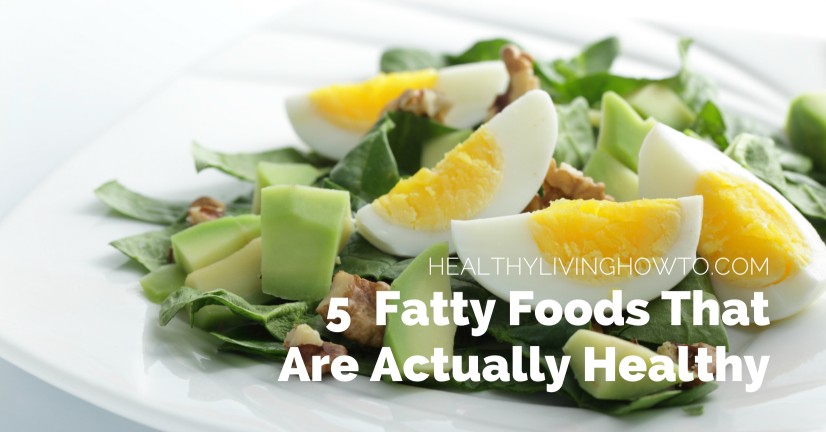The body needs saturated fat. It is necessary for many metabolic processes — cell membranes need saturated fat to function properly and our heart muscle actually prefers using saturated fat for energy. In 2010, a large meta-analysis (21 studies with nearly 350,000 subjects), published in the American Journal of Clinical Nutrition, concluded there is no association between saturated fat and heart disease. This meta-analysis opened the door to embrace what generations before us knew about nutrition, fat is not the enemy in the war on American's waistlines, it's the high intake of processed carbohydrates and excess consumption of sugar and trans-fats.
If you are ready to jump off the low-fat bandwagon and ditch processed foods for real food, then you will be sure to enjoy today's post — five fatty foods that are actually healthy.
5 Fatty Foods That Are Actually Healthy
1. Coconut Oil
Coconut oil is rich in medium-chain fatty acids which cannot be stored in the body. Instead, they get broken down and are used for energy production. The medium-chain fatty acids found in coconut oil are lauric acid, caprylic acid and capric acid. Lauric acid has the greatest antiviral activity. Nearly 50% of the fat found in coconut is composed of lauric acid. Caprylic acid is a potent yeast fighting substance. It is very effective in eradicating candida and other fungi. Capric acid has strong antimicrobial properties which can only be obtained by ingesting.
I recommend this resource to learn more about the healing power of coconut.
2. Heavy Cream
If you tolerate dairy, heavy cream, is amazing. Most people don’t realize this, but much of the research that shows people who consume dairy tend to weigh less, has been based on people who drink full-fat dairy products, not low-fat or non-fat dairy. Outside of the US, the majority of the rest of the world consumes only full-fat dairy products. Dairy fat is rich in conjugated linoleic acid, more so in grass-fed dairy than in conventional dairy, which has been shown to help people shed fat and gain muscle.
3. Egg Yolks
Look up the nutrition facts for egg yolks, and you will find, it reads more like a multi-vitamin than a food that has been demonized due to its saturated fat content. Just 3 egg yolks, not including the whites, provides over 50% of your daily need for Vitamin D and Selenium, over 40% of Vitamin B12, over 25% of Vitamin B5 and Phosphorous, and over 15% of Iron, Folate, Vitamin A, Vitamin B6, and Vitamin B2. These same three egg yolks also provides 8 grams of protein and 7% of your daily omega 3 fats. Egg yolks also contain the carotenoids, lutein and zeaxanthin, which are antioxidants believed to help prevent against degeneration and chronic disease.
4. Butter
Butter is rich in the healthy fat-soluble vitamins A, D, E, and K, which are critical to bone, brain, heart, and immune system function. Butter from grass-fed cows contains the cancer-fighting fatty acid conjugated linolenic acid which aids in weight loss and has been shown to slow the progression of some types of cancer and heart disease. Loaded with short chain fatty acids such as butyric acid–a fatty acid which is believed to prevent cancers and tumors – butter helps restore the integrity of the gut lining, reduces inflammation, has anti-viral properties, and has been shown to benefit those with gut disorders such as ulcerative colitis and Crohn’s disease.
If sensitive to dairy, I recommend ghee, which is made from butter and imparts the same benefits, only the dairy proteins are removed.
5. Avocado
Avocados are a good source of the mineral potassium which is essential for the proper functioning of the heart, kidneys, muscles, nerves and digestive system. While bananas are often recommended for their potassium status, ounce for ounce, avocados have bananas beat. Per ounce, bananas have 100 g of potassium, meanwhile, avocados have 144 g. In addition to saturated fat, avocados contain oleic acid, a monounsaturated fat, similar to the fat found in olives and olive oil and found to improve insulin sensitivity and play a role in the prevention of metabolic syndrome and type II diabetes.
If you liked this post, click below and give it a +1
Leave a comment below and tell me, what healthy fatty food would you add to this list?
